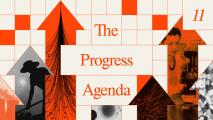When we want to make a change in life, especially a big change, it can be daunting. If we decide to lose several pounds, it’s easy to give up when we see little results after months and months of sweat, wheezing, and eating salad. Any gargantuan task, from self-improvement to writing a dissertation, brings on such a weary chorus of sighs that we find ourselves plodding along half-heartedly.
We don’t do well with vastness, and a distant horizon makes a lot of people say, “Screw it, I’m off for a drink.” And this has knock-on effects. When we fail in our goals, we are less likely to do well in the future. Success begets success, and failure repeats itself.
We expect too much of ourselves and others
There’s something wrong with each of us. Even if you tried to live a faultless, blameless, perfect life, there is always something left to criticize. You might be nobly philanthropic, but perhaps you take too much time for yourself. You might be a doting and diligent daughter, but perhaps you don’t call your dad as much as you should. You might be a Trojan at work, but perhaps you spend a bit of company time on social media. No one is perfect.
But the point is not to be perfect, but to be better; flawlessness is impossible.
We live in an age where we expect a lot of people. Mistakes, no matter how innocent, have ruined careers. Forgiveness seems as rare as the Egyptian phoenix. Yet, to see both yourself and other people as temporarily disappointing God(s) isn’t healthy. Instead, we should focus not on being the best, but rather being better than you once were. As the Roman Stoic, Seneca, put it:
“I am not a ‘wise man,’ nor… shall I ever be. And so, require not from me that I should be equal to the best, but that I should be better than the wicked. It is enough for me if every day I reduce the number of my vices, and blame my mistakes.”
The problem, though, is that the command to “be better” is a classic example of a vague, unhelpful resolution that usually will be broken by lunch time. Trite, vapid, and ill-defined targets will get you nowhere. That is why the Japanese philosophy of kaizen (改善) is so powerful and so useful. It makes the insurmountable manageable and allows us to accomplish even the greatest of tasks.
The philosophy of kaizen
Kaizen is not some ancient, arcane secret buried deep within some lost monastic scrolls. It’s a business practice popularized in the 20th century by Toyota — as in the car manufacturer.
It literally translates as “good change,” and it’s the practice of gradual, continuous improvement. It’s the philosophy that says we can all better ourselves, but the best (and most sustainable) way to do so is slowly and in small steps. Toyota was once a textile company, and its transition to making cars was not an overnight revolution (which is called kaikaku). Instead, there was a change here, a shift there. Every day something was different, every week something was better, and when a month became a year, incredible change had been achieved.
We live in an age of quick fixes and instant gratification, but kaizen is neither. Its slow, determined improvement can seem pointlessly small and insignificant when taken alone. But just as many drops will one day make an ocean, kaizen can transform any life. As the days turn to years, you will look back on who you were with new eyes.
Kaizen is a proven, effective, and practical way by which to be better.
Three examples of kaizen
We can all employ kaizen. It was literally invented to be applied to everyday life. Here are three practical (and common) examples how:
Tidying your house. No matter how large a house you have, the “spring clean” all too often gets delayed further and further until the spiders make claims for squatters’ rights. A big clean is an off-putting struggle, but the kaizen way is to say, “Today, I will do the bedroom, and nothing more.” Or, “I will do the chairs this morning, and the tables this afternoon.” It will probably take you longer, yes, but it gets done.
Sporting achievement. To the non-runners of the world, a marathon is a breathless feat of endurance. But any race or feat of endurance is simply one small step after another. Many are those runners who repeat, “Just to the top of that hill,” or, “Just one more mile,” over and over — until one mile becomes 26.2.
Changing your character. There’s a lot of truth in the power of habit. When we do a thing over and over, our brains literally rewire themselves. It’s impossible to “be kind” overnight. It takes small, gradual change — it takes kaizen. So, consciously try to do one kind thing before lunch. Do another one before you go to bed. Over time, kaizen teaches us that, one day, you will easily and habitually do kind things. You’ve become kind.
The philosophy of kaizen is also found in expressions like, “Rome was not built in a day,” and, “Good things come to those who wait.” It’s a hard trick to realize in an age where “slow” is seen as a vice. But, slowly, slowly and over great time, great things can be done.
This article was reprinted with permission of Big Think, where it was originally published.






